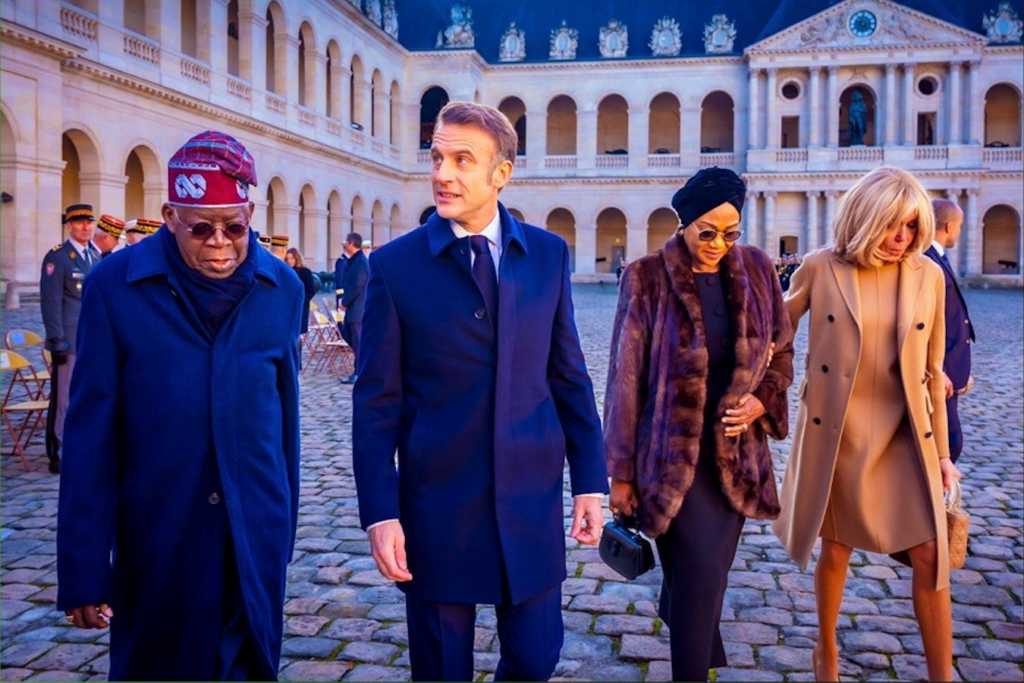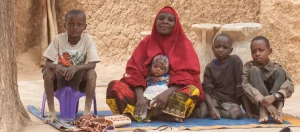
President Bola Tinubu’s visit to France reaffirmed Nigeria’s commitment to deepening bilateral ties and attracting investment in critical economic sectors.
This high-profile visit comes as 2024 half-year foreign trade data highlights France as Nigeria’s sixth-largest trading partner, with total trade volumes at N4.4 trillion.
Notably, exports to France stood at N3.4 trillion, making it Nigeria’s largest single-country export destination and second only to Africa as a region.
In a high-profile meeting at the historic Palais des L’Elysée, President Tinubu and his French counterpart, Emmanuel Macron, explored avenues to strengthen their economic and diplomatic ties.
Tinubu outlined an ambitious agenda focusing on key areas of collaboration, aimed at unlocking Nigeria’s untapped potential and fostering mutual prosperity.
the research highlights the ten key areas of economic partnership President Tinubu sought to strengthen during his visit to France, aimed at fostering mutual growth and unlocking Nigeria’s vast economic potential.
1. Agricultural Development and Food Security
President Tinubu called for French investment to bolster Nigeria’s agricultural productivity, emphasizing food security as a top priority. He noted:
“The French-Nigeria Business Forum is doing a lot already, but we need to do more on food security. We cannot help but invest in another’s country. It is our responsibility to put together a food security program for the private sector to come and invest in the country.”
Tinubu highlighted Nigeria’s flourishing financial sector as a catalyst for foreign investments in agriculture. He assured:
“Nigeria’s financial sector is evolving and flourishing. We are also creating grounds for investment in Nigeria’s economy for French nationals, especially in the area of food security.”
Nigeria’s financial services sector recorded a GDP growth rate of 30.83% in the third quarter of 2024 boosting overall GDP growth rate to 3.46%
The President invited French investors to explore opportunities in Nigeria’s underdeveloped solid minerals sector.
He emphasized de-risking the sector for easier investment:
“We should de-risk the opportunities in the solid minerals. We have the potentials and we have agreed on a deeper and deeper relationship.”
Under President Bola Tinubu’s Renewed Hope Agenda, Nigeria’s mining sector is set to become a key driver of economic diversification and growth.
The administration aims to modernize the Nigerian Minerals and Mining Act to attract global investors, ensure environmental sustainability, and improve community welfare.
Key initiatives include developing infrastructure to support mining operations, combating illegal mining through a dedicated Mining Marshal Corps, and fostering human capital development through training and research programs.
To boost foreign investment, incentives like tax waivers and security reforms have been introduced, alongside efforts to mandate local mineral processing and revoke dormant licenses.
3. Youth Development and Training
Tinubu stressed the importance of equipping Nigeria’s youthful population with skills through French-backed training initiatives. He stated:
“I can assure you that Nigeria is open for business. We have a vibrant youth population that is educated and ready to be trained in various areas of entrepreneurship and development.”
Tinubu requested specific programs aimed at building the entrepreneurial capacities of Nigerian youths.
4. Energy Transition
The President urged French companies to collaborate with Nigeria in its drive toward cleaner energy solutions while maximizing existing resources.
While not directly quoted in this sector, Tinubu’s broader remarks about foreign investments in critical areas aligned with Nigeria’s energy priorities.
Under President Bola Tinubu’s Renewed Hope Agenda, Nigeria’s energy transition plan aims to achieve net-zero emissions by 2060 while ensuring economic growth and energy access.
The strategy focuses on decarbonizing key sectors: power, cooking, oil and gas, transport, and industry.
Initiatives include increasing renewable energy contributions, promoting clean cooking technologies, and adopting natural gas as a transitional fuel.
The government is also investing in infrastructure, such as compressed natural gas (CNG) stations, to provide affordable alternatives to petrol and reduce transportation costs. International partnerships, like the agreement with Germany on wind energy development, support these efforts.
5. Blue Economy and Fisheries
Tinubu highlighted the opportunities in Nigeria’s untapped blue economy, particularly in fisheries, citing Lagos as an example of effective resource management:
“In Lagos, we have tamed the Atlantic Ocean. For us, fishery is an important aspect of investment.”
He encouraged French investors to explore these prospects, assuring:
“We want to assure the French investment community that Nigeria is open for business. It shall be easy in, and easy out.”
Under President Bola Tinubu’s Renewed Hope Agenda, Nigeria is prioritizing the development of its blue economy to stimulate economic growth and sustainability.
The administration is focusing on enhancing maritime security through initiatives like the Deep Blue Project, which has significantly reduced piracy in Nigerian waters and the Gulf of Guinea.
Collaborations with regional partners aim to address maritime insecurity comprehensively.
6. Security Cooperation
Acknowledging global security challenges, Tinubu called for collaborative measures to combat terrorism and reduce migration pressures. He stated:
“Nigeria is a partner in progress. We are ready to partner with France so that we can have security operations that will stop the challenge of migration.”
7. Education and Child Welfare
Tinubu emphasized the importance of child education and welfare as a cornerstone for national development. He noted:
“A starved nation will not care about weather or environment, and in the 21st century, no child should go to bed hungry.”
Proposing solutions, he said:
“If an African child is given a glass of milk in a class, there will be no problem in getting him to return and stay in school to learn. The more educated the children are, the better it is for us.”
8. Defense and Technology
In discussions on defense, Tinubu sought advanced technology solutions to address security threats and enhance Nigeria’s defense capabilities. He emphasized the shared responsibility of governments to ensure regional stability.
9. Support for Creative Industries
President Macron praised Nigeria’s creative industries as a growth engine and pledged France’s support. Tinubu encouraged deeper collaboration in promoting Nigerian art, music, and film globally, as part of broader youth-focused initiatives.
10. Trade and Investment Ease
Tinubu reaffirmed Nigeria’s openness to business and reassured potential French investors of a friendly operating environment:
“We are working on stability and we are getting closer and closer, but we can do better and better.”
He emphasized ongoing reforms to simplify trade and encourage foreign direct investment, stating:
“I can assure you that Nigeria is open for business.”
Macron’s Commitment to Strengthened Ties
President Emmanuel Macron described Tinubu’s visit as a landmark in bilateral relations, applauding his leadership and vision:
“You are the great leader of the great country in Africa. We appreciate your visionary leadership and energy in transforming the economy of your country.”
Macron pledged to expand cooperation, especially in solid minerals and youth development, emphasizing that global challenges require collaborative solutions:
“We have confidence that you, Mr. President, will reinforce our relationship with Nigeria, and it will cover the West Coast region, with ECOWAS playing the leading role.”








